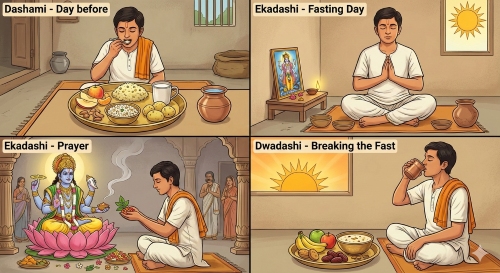Nirjala Ekadashi is one of the most sacred fasting days in Hindu tradition. Observed on the 11th lunar day (Ekadashi) of the waxing moon in the month of Jyeshtha (May/June), the day is dedicated to Lord Vishnu. Falling on June 6, 2025, this day holds deep spiritual and mythological significance in Hinduism.
Why Is It So Special?
Dedicated to Lord Vishnu, Nirjala Ekadashi is known as the most intense among the 24 Ekadashis observed throughout the year. “Nirjala” means “without water,” and devotees undertake a 24-hour fast without food or even a drop of water.
According to Hindu scriptures, observing this fast is believed to:
- Grant the spiritual merit of all 24 Ekadashis combined
- Purify the soul and cleanse one’s past sins
- Lead to prosperity, happiness, and ultimately moksha (liberation)
The Bhima Connection
The origin of this fasting is linked to Bhim, the mighty Pandava from the Mahabharata. Being fond of food, he found fasting difficult. Sage Vyasa advised him to keep just this one strictly observant Nirjala Ekadashi to receive the results of all Ekadashis.
Rituals to Observe
Before the fast: A light meal (excluding rice) is taken the previous evening, followed by prayers.
On the day:
- No food or water from sunrise to sunrise (or sunset, in milder practice)
- Prayers and Vishnu worship are central
- Next-day fast-breaking (Parana) must be done at the prescribed time

AI-generated image created with Google Gemini, January 01, 2026
Scientific & Health Insights
While primarily spiritual, the fast may offer physical and physiological benefits:
- Dry fasting gives the digestive system a complete rest. It works like a detoxification.
- Encourages cellular detox, improves focus, and builds mental discipline.
- It strengthens willpower and mindfulness.
Whether for spiritual merit or self-discipline, Nirjala Ekadashi offers a chance to reconnect with your health, mind, and a deep-rooted Hindu cultural tradition.
So, mark June 6, 2025, on your calendar and discover the transformative energy of Nirjala Ekadashi!
Feature Image Credit: Pinterest.




